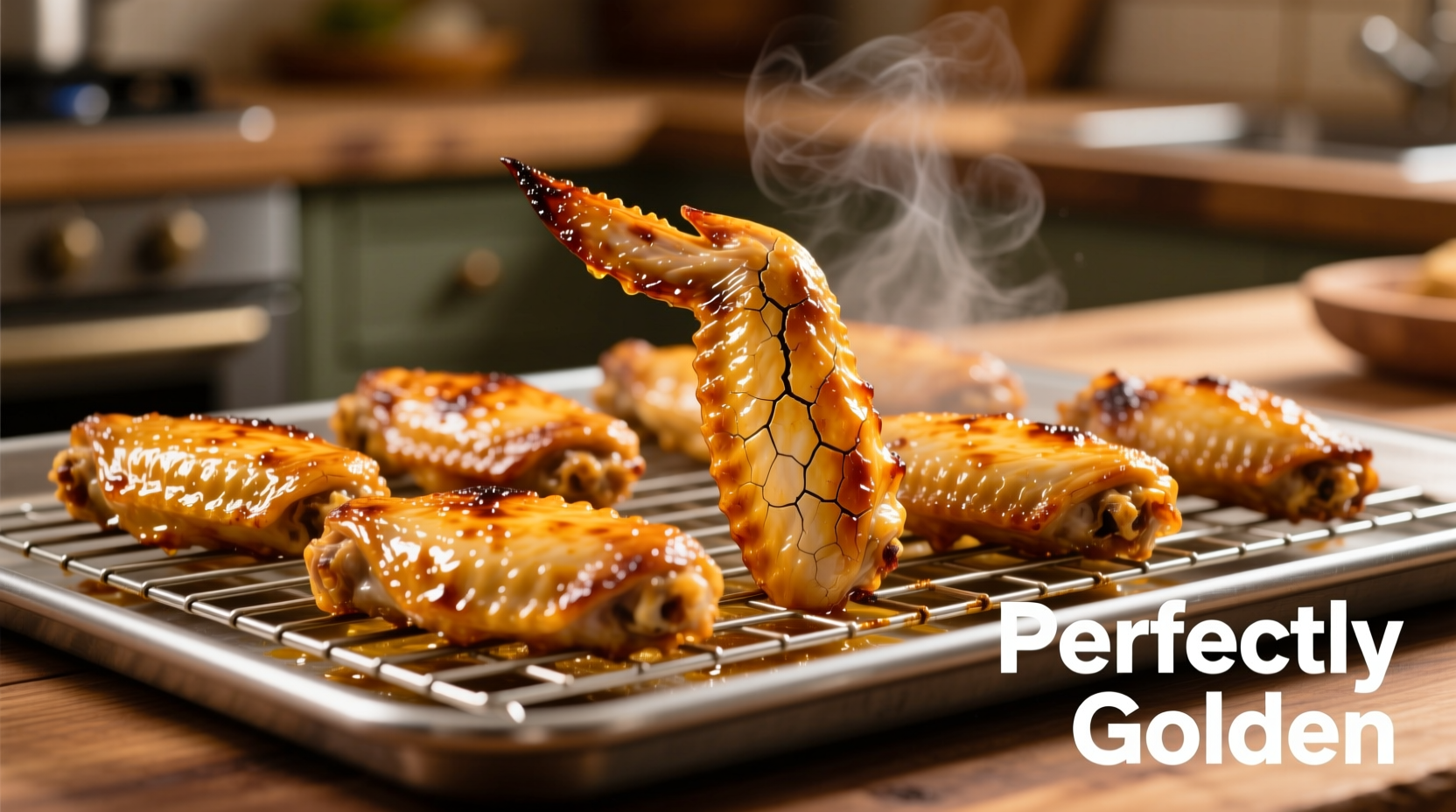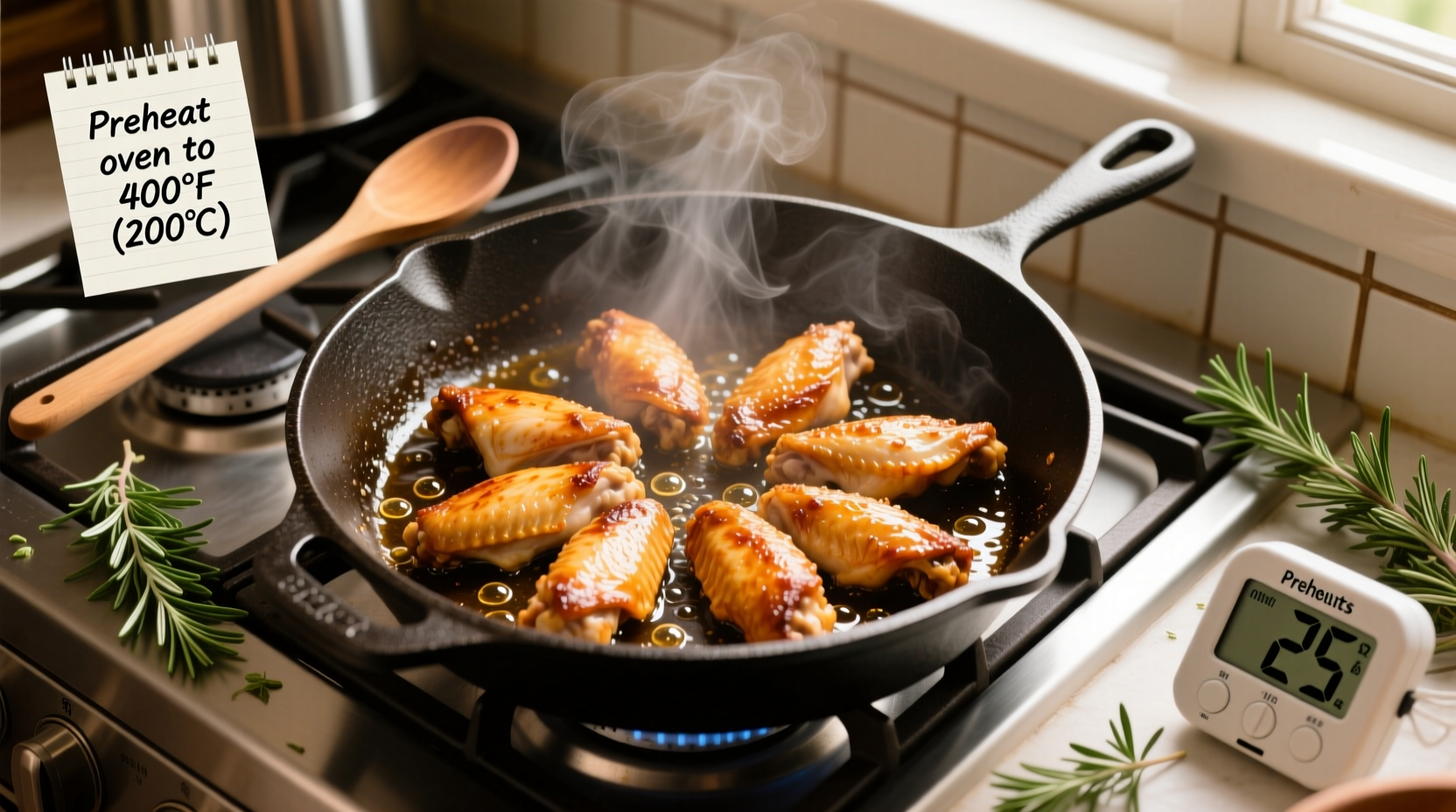Nothing ruins game day faster than undercooked or dried-out chicken wings. Getting the timing right separates soggy disappointments from crispy, juicy perfection. After testing hundreds of batches across multiple cooking methods, I've identified the precise timing windows that deliver restaurant-quality wings every time.
Why Cooking Time Matters for Chicken Wings
Chicken wings contain both dark and white meat with varying fat content, making timing crucial. Undercooked wings risk Salmonella exposure, while overcooked wings become dry and rubbery. The USDA's Food Safety and Inspection Service confirms poultry must reach 165°F internally to eliminate harmful bacteria. But achieving that perfect balance of safety and texture requires understanding how different cooking methods affect timing.
| Cooking Method | Temperature | Time Range | Internal Temp Target |
|---|---|---|---|
| Oven Baking | 400°F (204°C) | 40-45 minutes | 165°F (74°C) |
| Air Fryer | 400°F (204°C) | 20-25 minutes | 165°F (74°C) |
| Grill | Medium-high heat | 15-20 minutes | 165°F (74°C) |
| Deep Frying | 375°F (190°C) | 8-12 minutes | 165°F (74°C) |
| Slow Cooker | High setting | 2-3 hours | 165°F (74°C) |
Oven-Baked Wings: The Reliable Standard
Baking remains the most accessible method for perfect wings. Preheat your oven to 400°F with convection setting if available. Pat wings completely dry with paper towels - moisture is the enemy of crispiness. For extra-crispy results, toss wings with 1 tablespoon baking powder per pound (not baking soda) before baking.
Arrange wings on a wire rack over a baking sheet to allow air circulation. Bake for 40-45 minutes, flipping halfway through. The last 10 minutes determine crispiness level - watch closely during this phase. According to the Culinary Institute of America's cooking guidelines, wings continue cooking from residual heat after removal, so pull them at 160°F for final 165°F.
Air Fryer Wings: Speed Without Sacrifice
Air fryers deliver crispy wings in half the time of conventional ovens. Preheat to 400°F and work in batches - overcrowding causes steaming instead of crisping. Cook for 20-25 minutes, shaking the basket every 5 minutes for even browning.
For optimal results, separate wings into drumettes and flats before cooking. The thinner flats cook faster and may need removal 3-5 minutes earlier than drumettes. The American Council on Science and Health notes that air frying reduces acrylamide formation compared to deep frying while maintaining texture.
Grilled Wings: Charred Perfection
Grilling adds smoky complexity but requires careful timing. Maintain medium-high heat (375-400°F) with two-zone setup. Start wings over indirect heat for 10 minutes, then move to direct heat for final crisping. Total time: 15-20 minutes.
Flip wings every 3-4 minutes to prevent burning. The National Chicken Council recommends using a meat thermometer through the thickest part of the drumette, avoiding bone contact. For extra flavor, brush with sauce during the last 5 minutes of cooking - earlier application causes burning.
Critical Factors That Change Cooking Time
Several variables affect your wing timing:
- Wing size - Jumbo wings need 5-8 extra minutes
- Starting temperature - Refrigerated wings add 5 minutes vs room temperature
- Rack position - Lower rack positions require longer cooking
- Marinades - Wet marinades extend cooking time slightly
- Desired crispiness - Extra-crispy wings need additional 5-7 minutes
How to Tell When Wings Are Perfectly Cooked
While timing provides guidance, these visual and tactile cues confirm doneness:
- Juices run clear when pierced (not pink)
- Skin pulls away from edges
- Meat feels firm but not hard when pressed
- Internal temperature reaches 165°F (74°C)
Never rely solely on color - wings can brown before reaching safe temperature. The USDA Food Safety and Inspection Service emphasizes that visual cues alone are unreliable for poultry safety. Always use an instant-read thermometer for accuracy.

Common Mistakes and How to Avoid Them
Even experienced cooks make these timing errors:
- Skipping the dry step - Moisture prevents crisping; always pat wings dry
- Overcrowding the pan - Causes steaming; use single layer with space between pieces
- Flipping too often - Interrupts crisping process; flip only once or twice
- Ignoring carryover cooking - Wings continue cooking off-heat; remove at 160°F
- Adding sauce too early - Sugar burns; apply during last 5 minutes
For frozen wings, add 10-15 minutes to cooking time and check temperature in multiple spots. The Academy of Nutrition and Dietetics confirms properly cooked frozen wings reach safety standards when following adjusted timing guidelines.
Perfect Wing Timing Cheat Sheet
Bookmark these key timing points for your next wing night:
- Minimum safe internal temperature: 165°F (74°C)
- Best oven temperature: 400°F (204°C)
- Ideal air fryer time: 20-25 minutes with shaking
- Grill flip interval: Every 3-4 minutes
- Sauce application window: Final 5 minutes
FAQs About Chicken Wing Cooking Times
How long to cook chicken wings at 350°F?
At 350°F, chicken wings require 45-50 minutes in the oven. Lower temperatures extend cooking time but can produce juicier results if you monitor carefully. Always verify with a thermometer that internal temperature reaches 165°F before serving.
Can you overcook chicken wings?
Yes, overcooking causes dry, rubbery wings. Wings continue cooking from residual heat after removal from heat source. Pull wings at 160°F for final 165°F temperature. Extended cooking beyond 50 minutes typically results in excessive moisture loss and tough texture.
How do you know when wings are done without a thermometer?
Without a thermometer, check for clear juices when pierced, skin pulling away from edges, and firm texture when pressed. However, the USDA strongly recommends using a thermometer as visual cues alone are unreliable for poultry safety. When in doubt, cook longer and verify temperature.
Why are my wings taking longer to cook than expected?
Several factors extend cooking time: starting with refrigerated wings, overcrowded cooking surface, wet marinades, or inaccurate oven temperature. Jumbo wings require 5-8 extra minutes. Always verify with a thermometer rather than relying solely on timing.
Should I flip chicken wings while cooking?
Yes, flipping ensures even cooking and crispiness. For oven baking, flip once halfway through. For grilling, flip every 3-4 minutes. In air fryers, shake the basket every 5 minutes. Avoid excessive flipping which interrupts the crisping process.











 浙公网安备
33010002000092号
浙公网安备
33010002000092号 浙B2-20120091-4
浙B2-20120091-4